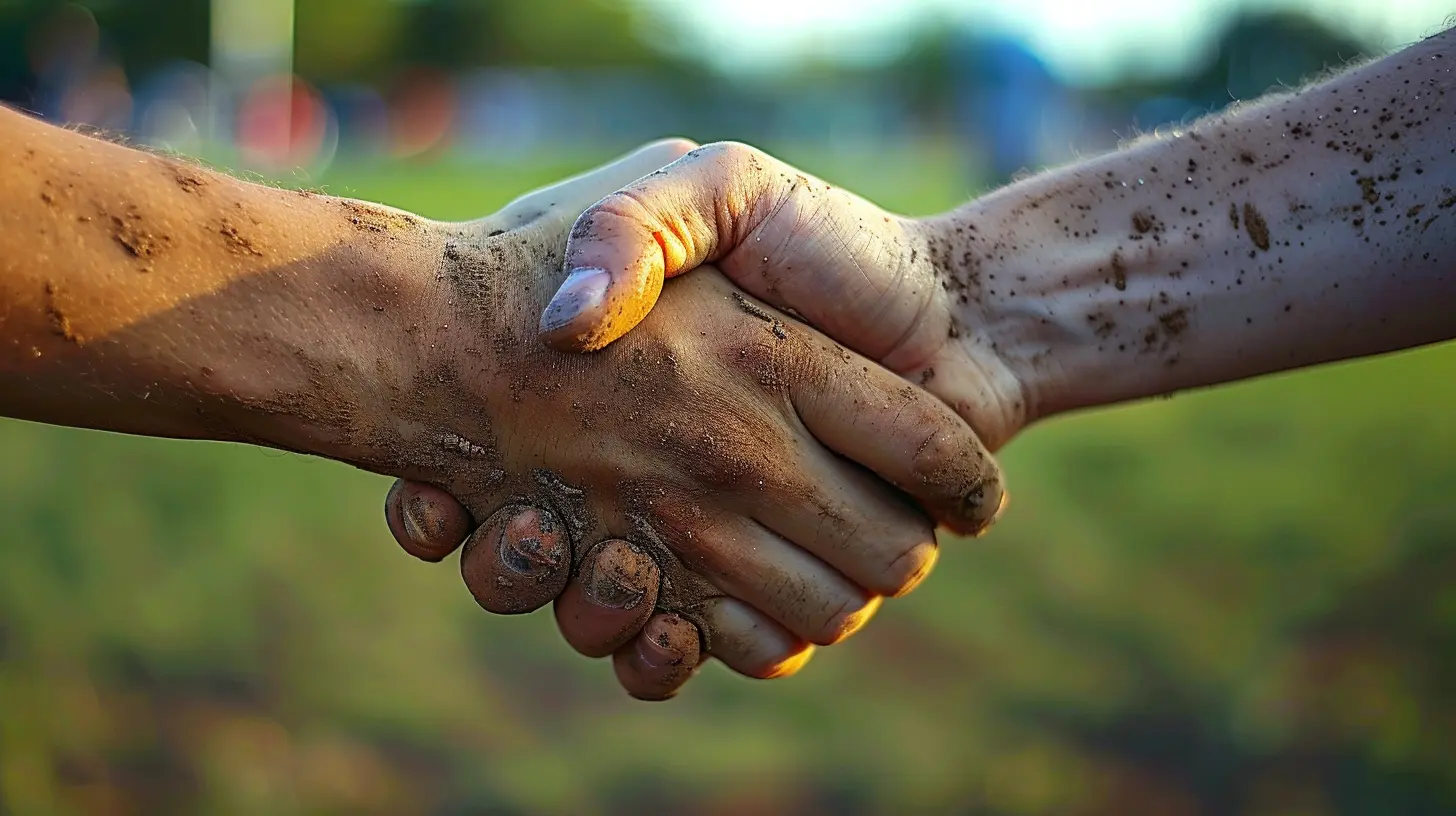16 December 2024
When we think about sports, it's easy to get caught up in the numbers. Who scored the most points? Who set the fastest time? Who achieved the highest ranking? But there’s a side of sports that goes far beyond the scoreboard. It’s the side where honor, respect, and sportsmanship reign supreme. These stories are often tucked away in the shadows of the headlines, yet they shine brighter than any trophy or medal ever could.
In this world, athletes are not only celebrated for their physical abilities but also for their character and integrity. And while the scoreboard may tell the story of who won or lost a game, it doesn't capture the moments where respect and sportsmanship truly define the spirit of competition.
So, let’s take a journey beyond the numbers and dive into some unforgettable stories of honor and respect in sports. These are tales that remind us that, at its core, sports isn't just about winning—it's about playing the game the right way.

The True Meaning of Sportsmanship
Before we dive into the stories, let's first talk about what sportsmanship really means. We hear the word thrown around a lot, but what does it actually stand for?Sportsmanship is about playing fair, showing respect for your opponents, and understanding that how you win (or lose) matters just as much as the final result. It’s about maintaining dignity, even when the stakes are high, and treating others with kindness, whether you’re on the field, in the stands, or watching from home.
In its essence, sportsmanship is a reflection of our values. It’s about being a good human, not just a good athlete. And while it’s easy to talk about sportsmanship, it’s a lot harder to live it, especially when emotions are running high. But the stories you're about to read will show you exactly what it looks like when athletes rise above the heat of competition and choose honor over everything else.

The 1936 Olympics: Jesse Owens and Luz Long
One of the most iconic stories of sportsmanship happened during the 1936 Berlin Olympics. You’ve probably heard of Jesse Owens, the African-American sprinter who won four gold medals in Hitler's Germany, proving to the world that race doesn’t determine athletic prowess.But what you might not know is the incredible friendship that blossomed between Owens and a German long jumper named Luz Long during those games. In the face of intense pressure to perform for Nazi Germany, Long, a tall, blonde athlete who epitomized Hitler’s "Aryan ideal," extended a helping hand to his competitor.
Owens was struggling during the long jump event, having fouled on his first two attempts. If he missed his third, he would be out of the competition entirely. Sensing Owens’ anxiety, Long approached him and gave him some advice on how to adjust his approach. Owens followed the advice, qualified, and eventually won the gold.
But the story doesn’t end there. After Owens secured his victory, Long was the first to congratulate him, embracing Owens in front of a stadium filled with Nazi propaganda. Their friendship continued after the games, and Owens later said that Long was the person who "went out of his way to help me" when he needed it the most.
In that moment, Long showed the world that sportsmanship transcends politics, race, and national pride. He knew that true honor comes from lifting others up, even if they’re your competitor.

Sara Tucholsky and the Home Run That Wasn't Hers
In 2008, a college softball game gave us one of the most heartwarming displays of sportsmanship ever witnessed. The game was between Western Oregon University and Central Washington University, and it was a pivotal moment in the playoffs.Western Oregon’s Sara Tucholsky, who had never hit a home run in her college career, finally sent the ball soaring over the fence. But in her excitement rounding first base, she missed touching the bag and, in turning back to correct the mistake, tore her ACL. She crumpled to the ground, unable to continue.
According to the rules, her teammates weren’t allowed to help her, or the home run wouldn’t count. It seemed like Sara’s dream of a home run was about to slip away. But then something amazing happened. Central Washington’s first baseman, Mallory Holtman, asked the umpire if she and her teammates could carry Sara around the bases. The rules allowed it, and so they did.
Holtman and another player picked Sara up and carried her, gently lowering her leg so she could touch each base. They carried her all the way home, ensuring the home run would count.
Central Washington ended up losing the game, but Holtman’s act of kindness made it clear that there was something far more important than the final score. It was a moment of pure sportsmanship, where the spirit of the game triumphed over the desire to win.

Novak Djokovic Consoles a Defeated Opponent
In 2020, during the Australian Open, Novak Djokovic showcased why he is not only a great tennis player but also a fantastic example of sportsmanship. After defeating his opponent Dominic Thiem in a grueling five-set match, Djokovic didn’t go straight into celebrating his victory.Instead, he walked over to Thiem, who was sitting in his chair, head hung low in disappointment. Djokovic put his arm around him and whispered words of encouragement. That small, yet powerful gesture spoke volumes about Djokovic’s respect for his opponent.
The Serbian tennis star knew better than anyone how crushing a defeat like that could feel, and in a moment where he could have basked in his glory, he chose instead to offer comfort. It’s moments like these that remind us why sports are about so much more than just winning.
Rugby: A Game Built on Respect
Rugby is often touted as one of the most physically demanding sports in the world. The collisions are brutal, the pace is relentless, and the stakes are high. Yet, rugby is also perhaps the sport that places the highest value on respect.One tradition that perfectly encapsulates this is the practice of forming a tunnel after each match. Regardless of how intense the game was, both teams line up and walk through each other’s tunnel, shaking hands and acknowledging one another. It’s a simple gesture, but it speaks to the deep-rooted respect the players have for one another.
And then there’s the haka, the traditional Maori dance performed by New Zealand's national rugby team, the All Blacks. While it might seem intimidating to face, opposing teams often show their utmost respect by standing their ground and watching in silence. It’s a powerful display of mutual reverence, where cultural tradition meets athletic competition.
Rugby teaches us that no matter how hard you fight on the field, once the final whistle blows, respect must prevail.
The Power of a Handshake in Football
In 2016, after a tightly contested match between Real Madrid and Atlético Madrid in the UEFA Champions League final, one moment stood out—not for its flair or drama, but for its quiet grace. Real Madrid’s Cristiano Ronaldo, known for his intense competitive spirit, approached Atlético's Antoine Griezmann after the game.Ronaldo had just helped his team secure victory, yet instead of celebrating, he took the time to console Griezmann, who was clearly devastated by the loss. The two exchanged a respectful handshake and a few words, which was a powerful reminder of how mutual respect can soften the blow of defeat.
In a sport where tempers can flare and egos can grow large, that handshake was a reminder that, at the end of the day, sports are about more than just the win. It’s about the people you play with and against, and the respect you show them along the way.
Conclusion: Why Sportsmanship Matters
At the end of the day, sportsmanship is what makes sports truly beautiful. It’s easy to get lost in the desire to win, to rack up stats, and to chase glory. But the athletes who really stand out are the ones who remember that honor and respect are just as important as any championship.The stories we’ve explored are just a small glimpse into the countless moments where athletes have chosen to rise above the competition and prioritize integrity over victory. Whether it’s carrying an opponent around the bases, offering a comforting word after a tough loss, or simply shaking hands after a match, these acts of sportsmanship remind us why we love sports in the first place.
It’s not about the scoreboard. It’s about the people. And that’s what makes these moments unforgettable.













Kismet McQuillen
This article beautifully highlights the true essence of sports, showcasing how honor and respect often outweigh the final score. Inspiring read!
March 24, 2025 at 12:28 PM